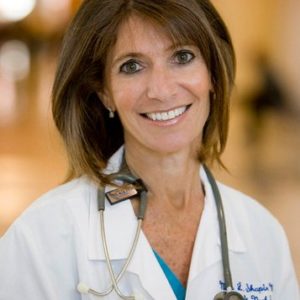Takeaway
It’s important to remind patients and loved ones that avoiding unnecessary socialization and travel can save lives.

Passion in the Medical Profession | May 14, 2020 | 3 min read
By Nina Shapiro, MD, University of California Los Angeles
My husband and I have always relished being in the thick of it, “in the trenches,” at our hospital. He’s a head and neck cancer surgeon, and I’m a pediatric otolaryngologist (ear, nose, and throat specialist for children). With over five decades of combined experience working at an academic tertiary/quaternary care center in a major city, we feel as though we’ve nearly seen it all. We’ve cared for the sickest of the sick, and patients often came to us when there was nowhere left to go. We were, for all intents and purposes, the last resort, the end of the line.
Now we’re seeing our colleagues—anesthesiologists, intensive care specialists, emergency room physicians, nurses, medical assistants, and respiratory therapists—as our front line heroes. They’re the first responders as well as the last resort, the end of the line. Like hospitals around the world, we’ve cancelled our elective visits and surgeries in order to minimize the use of supplies and personnel, as well as to minimize person-to-person exposure.
For now, our job is to keep our patients at home. Some cancer and airway surgeries absolutely cannot wait, but some of them can. As patients flood hospitals, supplies are running low and healthcare workers fall ill, it will likely be “all hands on deck” soon. We’ll no longer be subspecialty surgeons caring for complex surgical patients. We’ll be part of the care force caring for COVID-19 patients: the first responders and the last resort. Until then, we need to stay healthy. For me, that means to keep running. Pre-COVID, my morning run was a time to myself to exercise, breathe fresh air, think, meditate, and take in the sights. As a surgeon who operates on the airways of tiny humans, these times of tranquility are critical to my well-being. But today’s run was anything but peaceful. As I turned on to a busier thoroughfare, I noticed large groups of cyclists, walkers going to pick up coffee, and runners in packs. None with masks. These weren’t families, but friends congregating. I felt angry and frustrated.
While families stuck at home certainly face challenges, healthcare professionals worry about catching the virus at work, spreading it to co-workers or to sick patients, and bringing it into their homes. Two-physician families have reviewed their wills and drafted contingency plans for children if one or both gets sick, hospitalized, debilitated, or worse.
I’ve racked my brains on how to channel the anger when I see that health-minded people just don’t fathom the harm they’re causing. It reminded me of some of the rationale I’ve heard from anti-vaxxers: “My children are healthy.” “Measles really isn’t a big deal if you have a good immune system.” “I’m taking immune boosters, so I won’t get sick.” When it comes to vaccine-preventable diseases, or any infectious disease, there’s no personal connection while reading graphs and medical data. Often, only personal experience makes diseases real. When it comes to COVID-19, many people are starting to feel removed if they feel fine, and are frustrated being stuck at their homes. Data in the news isn’t personal. However, it’s important for everyone to know that every time they congregate with someone from outside their home, they’re potentially responsible for one death. Every time. Patients, friends, family, and neighbors often ask clinicians how they can help. The most important thing everyone can do is to stay at home, even as states start to ease restrictions. When people stay at home, they’re doing more than they could possibly imagine. They can save the lives of friends, neighbors, family, and healthcare professionals. They can save their grocery worker’s life, their postal worker’s life, their delivery person’s life. People may think they’re doing “nothing” by staying at home, but in fact, they’re doing everything.

